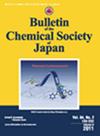Structural Generation by Inverse Transformation Using Principal Component Analysis Enhances Conformational Sampling of
IF 3.8
3区 化学
Q2 CHEMISTRY, MULTIDISCIPLINARY
引用次数: 0
Abstract
Molecular dynamics (MD) simulations are frequently used to elucidate the molecular mechanisms underlying protein behaviour. Based on a conformational search with MD simulations, protein structures rich in high-dimensional data can be quantitatively evaluated in free-energy landscapes (FELs). Generally, FELs are defined in low-dimensional subspaces spanned by reaction coordinates (RCs) to characterize biological functions. When calculating FELs of proteins, principal component analysis (PCA) is particularly useful for capturing large-amplitude motions via dimensionality reduction into low-dimensional subspaces. In this study, to efficiently calculate FELs, a simple and convenient method is proposed by accelerating conformational search in a PCA subspace, which is achieved by quick generation of protein configurations. Specifically, inverse transformation driven by PCA facilitates the quick generation of diverse protein configurations from arbitrary grids in a defined PCA subspace. In our conformational search, a set of newly generated configurations serves as initial structures for multiple MD simulations, enabling one to calculate FELs of proteins by building Markov state models from their multiple trajectories. In conclusion, the conformational search from protein configurations broadly distributed in a PCA subspace accelerates FEL calculations, which supports a comprehensive approach to understanding collective protein dynamics.利用主成分分析法通过反变换生成结构增强了对
分子动力学(MD)模拟常用于阐明蛋白质行为的分子机制。基于 MD 模拟的构象搜索,可以在自由能谱(FEL)中定量评估富含高维数据的蛋白质结构。一般来说,自由能谱是在反应坐标(RC)所跨的低维子空间中定义的,用于描述生物功能。在计算蛋白质的 FELs 时,主成分分析(PCA)对通过降维到低维子空间来捕捉大振幅运动特别有用。本研究提出了一种简单易行的方法,通过快速生成蛋白质构型,加速 PCA 子空间中的构象搜索,从而高效计算 FEL。具体来说,由 PCA 驱动的反变换有助于在定义的 PCA 子空间中从任意网格快速生成多种蛋白质构型。在我们的构象搜索中,一组新生成的构象可作为多个 MD 模拟的初始结构,使我们能够通过从蛋白质的多个轨迹建立马尔可夫状态模型来计算蛋白质的 FEL。总之,从广泛分布于 PCA 子空间中的蛋白质构象中进行构象搜索可以加速 FEL 计算,从而为理解蛋白质的集体动力学提供了一种全面的方法。
本文章由计算机程序翻译,如有差异,请以英文原文为准。
求助全文
约1分钟内获得全文
求助全文
来源期刊
CiteScore
6.40
自引率
5.00%
发文量
194
审稿时长
3-8 weeks
期刊介绍:
The Bulletin of the Chemical Society of Japan (BCSJ) is devoted to the publication of scientific research papers in the fields of Theoretical and Physical Chemistry, Analytical and Inorganic Chemistry, Organic and Biological Chemistry, and Applied and Materials Chemistry. BCSJ appears as a monthly journal online and in advance with three kinds of papers (Accounts, Articles, and Short Articles) describing original research. The purpose of BCSJ is to select and publish the most important papers with the broadest significance to the chemistry community in general. The Chemical Society of Japan hopes all visitors will notice the usefulness of our journal and the abundance of topics, and welcomes more submissions from scientists all over the world.

 求助内容:
求助内容: 应助结果提醒方式:
应助结果提醒方式:


